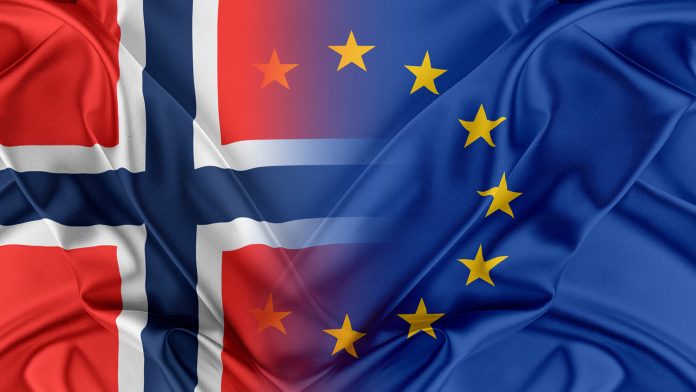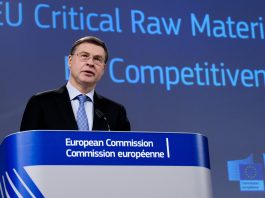In a landmark move, the EU and Norway have sealed a partnership for sustainable land-based raw materials and battery value chains.
A Memorandum of Understanding (MoU), signed by Maroš Šefčovič, Executive Vice-President for the European Green Deal, and Jan Christian Vestre, Minister of Trade and Industry of the Kingdom of Norway, outlines a comprehensive framework for raw materials and battery value chains collaboration between the EU and Norway.
This significant agreement marks a pivotal milestone in the EU-Norway Green Alliance, initially announced by Commission President Ursula von der Leyen and Norwegian Prime Minister Jonas Gahr Støre in April 2023.
Leveraging their geographical proximity, the alliance aims to bolster integration, thereby mitigating the risks of trade disruptions while enhancing the overall competitiveness of both economies.
Moreover, the initiative is anticipated to generate high-quality job opportunities, contributing to sustainable economic growth.
The timing of the agreement is particularly poignant, coinciding with the 30th anniversary of the European Economic Area Agreement, which solidifies Norway’s participation in the Single Market.
This agreement has long been hailed as a cornerstone of EU-Norway relations, emphasising the mutual benefits and potential for further collaboration.
Šefčovič commented: “We are bringing cooperation between the EU and Norway to another level, as today’s signature is of strategic value.
“It will create a wide range of business and research opportunities on both sides, strengthening both our industrial base and our political bond.”
How Norway will bolster EU raw materials and battery value chains
Norway, a nation abundant in mineral resources, including rare earths, magnesium, titanium, vanadium, and phosphate rock, boasts a substantial processing capacity for various raw materials.
Over recent years, Norway has witnessed a notable surge in the battery sector, marked by the emergence of numerous ventures spanning the entire value chain.
These vast resources and expertise will be essential to reinforcing EU raw materials and battery value chains.
Supporting the growing EU battery sector
The EU boasts a flourishing market for green technologies, particularly batteries, with an estimated demand reaching 175 GWh in 2023.
The EU’s battery industry stands as the second-largest globally, supported by existing facilities capable of ramping up to 220 GWh in capacity.
Moreover, the region is witnessing a surge in battery manufacturing endeavours, with an additional 1 TWh of projects either announced or currently in the construction phase.
This robust demand landscape presents a plethora of opportunities for forging offtake agreements, engaging in joint ventures, and collaborating on research and innovation (R&I) projects.
Furthermore, the EU is actively harnessing its potential in critical and strategic raw materials, paving the way for potential collaborations with Norwegian counterparts.
Details of the EU-Norway partnership
The MoU establishes a robust framework for close collaboration between the EU and Norway across five key areas:
Integration of raw materials and battery value chains
The MoU aims to foster joint investment projects by facilitating partnerships such as joint ventures, consortia, and special-purpose vehicles among industrial players.
This collaboration seeks to link final users with raw materials suppliers, enhancing efficiency and sustainability across the value chains.
Co-operation on research and innovation (R&I)
Both parties commit to collaborative R&I efforts, leveraging joint projects to drive potential industrial adoption and implementation.
Norway’s active participation in the EU Framework Programme for R&I – Horizon 2020 and its continued involvement in Horizon Europe underscores the commitment to advancing innovation collectively.
Adherence to high environmental, social, and governance standards
The MoU promotes the application of rigorous environmental, social, and governance standards throughout the raw materials and battery value chains.
Mutual consultation and exchange of information on relevant policies and initiatives, including recycling and waste management, will facilitate the adoption of best practices.
Mobilisation of financial and investment instruments
Financial and investment support for projects under the partnership will be facilitated through mechanisms such as Invest EU, the European Raw Materials Alliance, and the European Battery Alliance.
This mobilisation aims to accelerate the development and deployment of sustainable initiatives within the raw materials and battery sectors.
Development of skills for high-quality jobs
The MoU emphasises the importance of nurturing the necessary skills for high-quality jobs in the raw materials and battery sectors.
Stakeholder mobilisation and financial support for initiatives such as the European Battery Academy will play a pivotal role in enhancing workforce capabilities and driving sectoral growth.
Following the signing of the deal, the EU and Norway will collaborate with stakeholders to implement the roadmap for the partnership.









